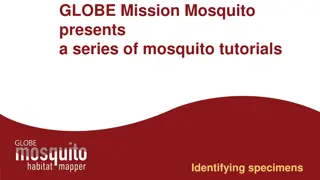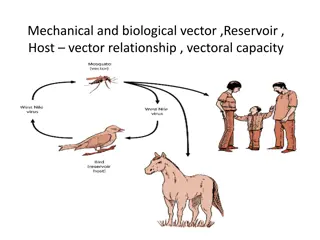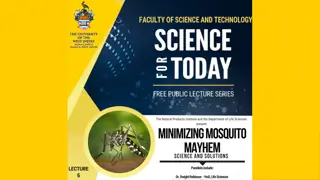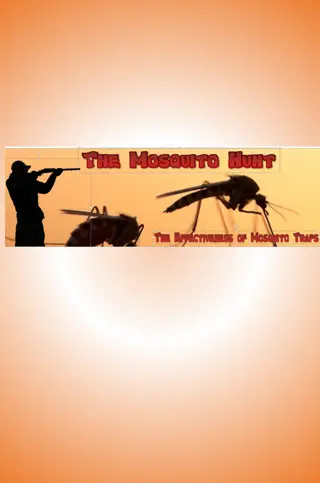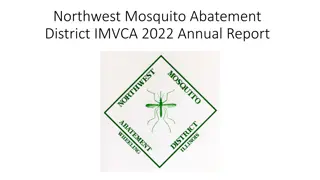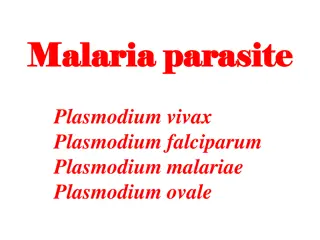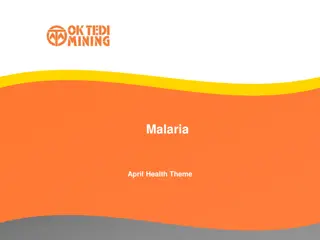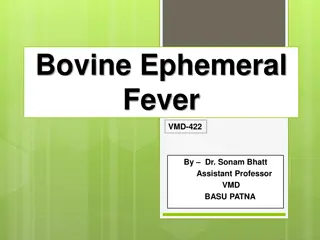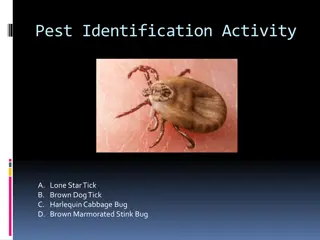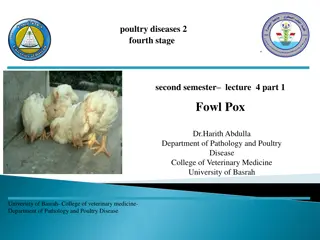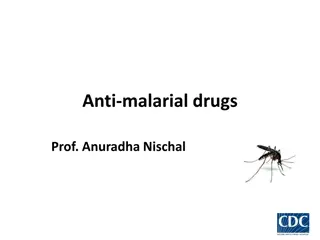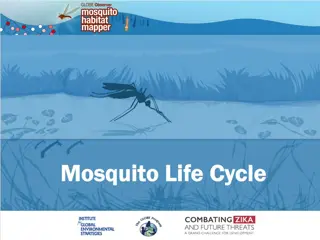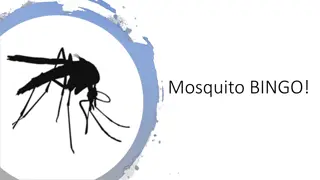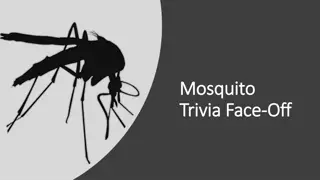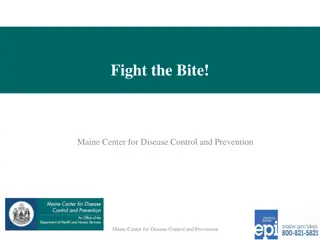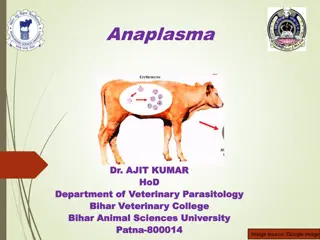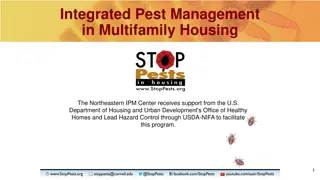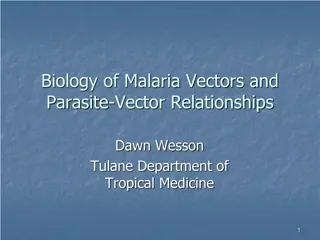Understanding Dengue: A Global Epidemic
Dengue is an epidemic disease caused by the dengue virus transmitted by mosquitoes. It affects millions of people each year, leading to severe symptoms such as fever, rash, and body pain. Early detection through laboratory tests is crucial to prevent complications. Proper management, including preve
4 views • 11 slides
Understanding Mosquito Larvae: Identification and Anatomy
Explore tutorials from GLOBE Mission Mosquito focusing on identifying mosquito larvae specimens including Anopheles, Aedes, and Culex genera. Learn about the morphological characteristics, habitats, and anatomy of mosquito larvae to understand their role as disease vectors. Detailed descriptions and
11 views • 22 slides
Complete Overview of GYSBI Shore Base Inc. Services and Facilities
GYSBI Shore Base Inc. in Guyana offers a comprehensive range of services including snake control, flies/mosquitoes spraying, rodent control, and bee/wasp removal with 24/7 service availability. The base features key areas such as the port facility, industrial estate, maintenance workshop, fuel farm,
1 views • 4 slides
The Impact of Malaria Eradication Programs in Sub-Saharan Africa
Malaria, an infectious disease transmitted by mosquitoes, poses a significant threat in Sub-Saharan Africa where over half a billion people are affected annually. Despite various efforts including global eradication programs, the focus on prevention rather than treatment is deemed crucial to minimiz
0 views • 14 slides
Vector Relationships and Pathogen Transmission
Understanding mechanical and biological vectors, reservoir hosts, and their role in disease transmission is crucial for effective disease control. Mechanical vectors like flies can transfer pathogens without getting infected, while biological vectors like mosquitoes carry pathogens that reproduce in
1 views • 5 slides
Understanding the Impact of Mosquitoes on Humans: Causes and Solutions
Mosquitoes have been around longer than humans and play vital ecological roles. However, they also pose risks as disease vectors. The evolution of mosquitoes, human activities, and mosquito bites are explored along with ways to address this issue.
0 views • 21 slides
Investigating Mosquito Attractants for Effective Trapping in Queens
Mosquitoes are vectors for spreading diseases, prompting a study to test the effectiveness of various attractants in trapping them. Results indicate carbon dioxide and lights are effective attractants, while KCl did not attract mosquitoes. The study aims to develop targeted traps for efficient mosqu
0 views • 4 slides
Northwest Mosquito Abatement District IMVCA 2022 Annual Report
The Northwest Mosquito Abatement District covers 242 square miles with over 10,000 ditches, retention/detention ponds, and natural water bodies. They monitor mosquito populations using surveillance traps and track nuisance mosquitoes and vector mosquitoes like those carrying West Nile virus. The rep
0 views • 6 slides
Understanding Malaria Parasites and Their Life Cycle
Malaria parasites, including Plasmodium vivax, falciparum, malariae, and ovale, exhibit an alternation of generations phenomenon with a life cycle involving asexual and sexual phases. These parasites require both vertebrate and invertebrate hosts for development, with maturation stages involving gam
0 views • 30 slides
Understanding Malaria: Causes, Symptoms, and Prevention
Malaria is an infectious disease caused by the Plasmodium parasite, transmitted through the bite of a female Anopheles mosquito. There are four types of Plasmodium parasites, with Plasmodium falciparum being the most severe. Malaria incidence globally has seen millions of cases with significant mort
9 views • 14 slides
Understanding Bovine Ephemeral Fever: Key Information and Insights
Bovine Ephemeral Fever, also known as Three-Day Sickness or Three-Day Fever, is an economically important arboviral disease affecting cattle and water buffalo in tropical and semitropical regions. It is caused by an arthropod-borne rhabdovirus and primarily transmitted by mosquitoes and biting midge
0 views • 19 slides
Exploring the Fascinating World of Protozoa and Plasmodium spp.
Dive into the intricate life cycle of Protozoa and Plasmodium spp., with detailed images showcasing stages from sporozoites to gametocytes. Learn about the Ookinete, Oocyst, and Sporozoites, each with unique shapes and characteristics. Explore the transfer stages between mosquitoes and humans, unrav
0 views • 12 slides
Pest Identification Activities for Common Pests
Engage in pest identification activities featuring various common pests such as ticks, bugs, mosquitoes, and more. Explore images and descriptions to learn about different pests and enhance your knowledge in pest recognition.
0 views • 26 slides
Understanding Fowl Pox in Avian Species: Causes, Symptoms, and Diagnosis
Fowl Pox, caused by Avipoxvirus, is a contagious disease in birds characterized by wart-like nodules and diphtheritic membranes in the throat and mouth. It has multiple forms, including dry pox, wet pox, and coryza-like form, with varying clinical signs. The disease spreads through mosquitoes, bitin
1 views • 10 slides
Understanding Malaria: Causes, Symptoms, and Treatment
Malaria, caused by the Plasmodium parasite and transmitted through the bite of infected mosquitoes, is a major global health concern leading to millions of illnesses and deaths annually. The life cycle of the parasite involves different stages in the human host and the mosquito vector. Effective ant
1 views • 107 slides
Exploring the Fascinating Mosquito Life Cycle
Dive into the intriguing world of mosquitoes through images and informative descriptions discussing their life cycle stages, important vocabulary, and behaviors. Learn about how female mosquitoes lay eggs, where larvae hatch and develop, and how adult mosquitoes thrive in different environments. Exp
0 views • 16 slides
Fun and Educational Mosquito BINGO Game for Learning About Mosquito Prevention
Explore the world of mosquitoes through this interactive Bingo game filled with educational content about mosquito habits and prevention methods. Put your knowledge to the test as you match items like antennas, eggs, and insect repellent on the board. Learn valuable tips on how to protect yourself f
0 views • 27 slides
Mosquito Trivia: Curious Facts About These Pesky Insects
Discover interesting facts about mosquitoes in this trivia face-off! Learn what a female mosquito uses to pierce the skin, why they need blood, what male mosquitoes feed on, and where their legs attach to their body.
0 views • 89 slides
Japanese Encephalitis: Overview and Management
Japanese encephalitis (JE) is a viral infection of the brain spread by mosquitoes, with symptoms ranging from mild fever to severe complications like encephalitis. Prevention is key through vaccination and avoiding mosquito bites. Diagnosis involves blood or CSF testing. Lifelong neurological issues
0 views • 9 slides
Importance of Mosquito Control for Disease Prevention in Maine
Learn about mosquitoes, their habitats, diseases they can carry, and ways to prevent mosquito bites to protect yourself from diseases such as Eastern Equine Encephalitis (EEE) and West Nile virus in Maine.
0 views • 16 slides
Laboratory Evaluation of Bite Protection from Repellent-Impregnated Clothing for the Military
The study protocol outlines a laboratory evaluation of the efficacy of etofenprox-treated military uniforms in providing bite protection against mosquitoes. The research aims to standardize the experimental approach for assessing repellent-treated textiles, particularly focusing on the performance o
0 views • 45 slides
Overview of Anaplasma Marginale: Disease, Transmission, and Life Cycle
Anaplasma marginale, a species of small round bodies found inside erythrocytes, is the causative agent of anaplasmosis in animals. This pathogen is primarily transmitted by various species of ticks, biting flies, and even mosquitoes. The disease can be mechanically spread through contaminated blood
0 views • 13 slides
Integrated Pest Management in Multifamily Housing: Protecting Health and Homes
Learn about the essential Integrated Pest Management (IPM) program supported by the U.S. Department of Housing and Urban Development for multifamily housing. Discover the importance of controlling pests like cockroaches, rodents, and bed bugs, along with the health threats they pose. Find out how IP
0 views • 17 slides
Understanding Malaria Vectors and Their Habitats
Explore the complex relationships between malaria vectors and parasites, highlighting the biology and life cycles of Anopheline mosquitoes. Discover the diverse species within the Culicidae family and their preferences in habitat, influenced by human activities. Gain insights into the genus Anophele
0 views • 47 slides
Understanding Chikungunya Virus: Symptoms, Transmission, and Diagnosis
Chikungunya virus, derived from the Makonde language, causes sudden onset of high fever, joint pain, rash, and other symptoms. It is transmitted by Aedes mosquitoes and can result in debilitating joint pain. Diagnosis involves clinical evaluation and laboratory tests for confirmation.
0 views • 9 slides
Exploring Mosquitoes and Public Health Initiatives
Delve into the world of mosquitoes and their role in spreading diseases like malaria, as well as the efforts by organizations like the CDC to control outbreaks through research and community involvement. Learn about the significance of trapping mosquitoes, the impact of infectious diseases, and the
0 views • 15 slides

